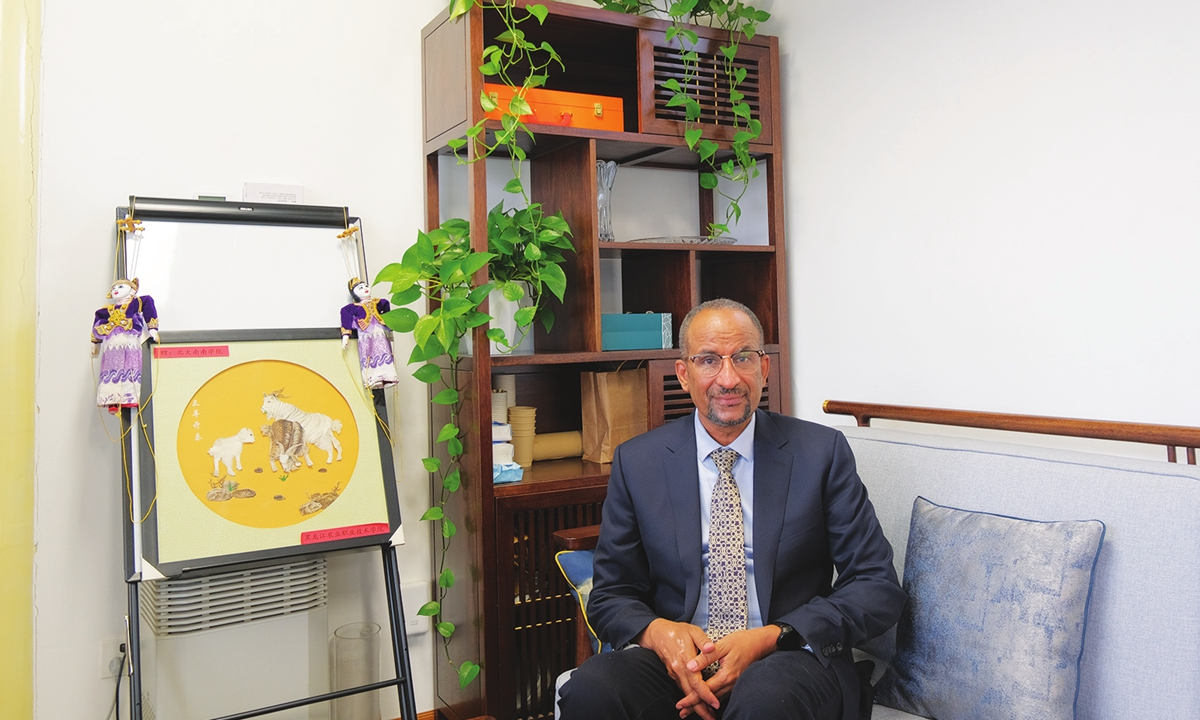Former Ethiopian minister experiences China firsthand
Apr 01, 2024
Teka Gebreyesus Entehabu Photo: Bi Mengying/GT
Peking University, April 1, 2024: Teka Gebreyesus Entehabu, who was the then Ethiopian state minister for trade and industry, took a challenging yet rewarding transition. He came to China three years ago and started pursuing a PhD at Peking University's Institute of South-South Cooperation and Development.
"I have been here for many times in China as a government official. There are so many differences; when you come every time you can see all the growth in the development. How did the Chinese government and the Chinese people achieve this within a short period of time?" Entehabu told the Global Times.
The transition from a ministerial position to a full-time student was very challenging, but he was greatly inspired by China's path to success and keen to know more details about its measures. Therefore, when he heard about a scholarship program to study in China, "I didn't waste a second to apply," he recalled.
From minister to full-time student
Established in 2015, the Institute of South-South Cooperation and Development serves as a platform for better equipping the remarkable talent with the expertise and experiences to shape the future of developing countries.
"Having studied in different countries, I am deeply impressed by the high standard and the practicality of higher education in China," Entehabu said.
There have been many field trips and site visits which allowed him to witness China's modernization, industrialization, and technological development first hand.
Reflecting upon his visit to the Alibaba headquarters in Hangzhou, capital of East China's Zhejiang Province, Entehabu said that "technology has been a key factor in China's modernization." During his visit to the Shenzhen Stock Exchange in South China's Guangdong Province, he came to realize that it was the concerted efforts, responsibility, and shared visions for development that made Shenzhen a pioneer in China's development.
In addition to the quality and the practicality of China's education, China's role as a developing country that is open to share its experience to success without imposition makes it attractive to leaders from the Global South.
Take Ethiopia for instance. Former Ethiopian president Mulatu Teshome also studied in China. In 1976, he came to China to study Chinese sponsored by the Ethiopian government and started at the Beijing Language Institute, now known as Beijing Language and Culture University today. He then went to the Department of Philosophy of Peking University for a bachelor's degree and furthered his studies in the realm of international politics at Peking University for his master's and doctoral degrees.
"Some of the Western people say China's development is a miracle because this is beyond their imagination. The same as China, Ethiopia is also a developing country and we need to learn from China. That's why we, government leaders come here to study," said Entehabu.
Looking forward, Entehabu expressed strong hopes for the further strengthening academic and educational exchanges between Ethiopia and China, not only in post graduate study, but also at the undergraduate level. It is not only limited to Ethiopia, but also other developing countries in Africa. It will help with the development of the Global South, he said.
When coffee meets tea
During his time living in Beijing, the hospitality, friendliness, and kindness of Chinese people left Entehabu with a deep impression. When he had problems, local people often offered to help him. Even though they didn't speak the same language as him, they would resort to translation apps to help him.
"In Ethiopia, we attach importance to family. We have extended family that we live together with. And from what I have observed, the Chinese give family number one importance as well," he said this aspect of Chinese culture reminds him of home and made him feel more connected to China.
China's culture is so rich and diverse. Take its food for instance. It's so different from what you have in Beijing to the food in South China's Guangdong Province. People from different cultures will have to explore by themselves to find their favorite Chinese cuisine.
"I don't take spicy food, but some of my friends from Ethiopia love it. In Chongqing and Chengdu, they were so happy to have that kind of spicy food in China," he said.
Known as the birthplace of coffee, coffee is a significant part of Ethiopian culture. Ethiopians have a very traditional coffee ceremony. Drinking coffee is about getting together and sharing ideas. The routine is part of people's daily lives, said Entehabu.
Besides its cultural values, coffee exports also play an important role in the country's revenue. China is among the major destinations of Ethiopia's coffee exports. At local coffee shops in China, single origin coffee beans from Ethiopia are sought after by Chinese customers.
"I'm glad to see the trend of increasing popularity of coffee drinking in China. It's not only about the cultural exchanges between the tea culture and coffee culture. There's also a lot we can do to further promote trade," he added.
Expanding on the topic of cultural exchanges, Entehabu touched upon the China-proposed Global Civilization Initiative (GCI). The initiative guides people to reflect on the essence of one's own culture, and the values and lessons they could learn from other cultures.
"Ethiopia also has a long history and ancient civilization. The cultural exchanges between Ethiopia and China have been vibrant, but there's much more that can be done and should be done. How can we learn from the civilization of China? What civilization aspects can we share with China? We need to work on this together through deeper and further cultural exchanges," he said.
Source:
Global Times
Written by:
Bi Mengying
